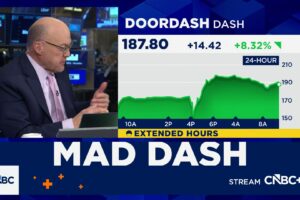
U.S. stocks were higher in Monday’s final hour of trading, with the S&P 500 remaining near the top end of its recent range as the first full week of first-quarter earnings season got under way.
How stocks are trading
- The Dow Jones Industrial Average DJIA, +0.25% was up 50 points, or 0.2%, at 33,936.
- The S&P 500 SPX, +0.30% was up 5 points, or 0.1%, at 4,143.
- The Nasdaq Composite COMP, +0.28% was up 9 points, or less than 0.1%, at 12,132.
Last week, the Dow booked a fourth straight week of gains for its longest winning streak since October, according to Dow Jones Market Data.
What’s driving markets
The first-quarter earnings-reporting season picks up steam this week, with 60 S&P 500 companies, including six Dow components, reporting quarterly results, according to FactSet. Until the final hour of trading, stocks were mostly lower for much of Monday’s session as Wall Street analysts remained pessimistic about results for the quarter and the prospect of another so-called earnings recession.
“The market is cautiously looking at earnings,” said Ty Young, founder and chief executive of Ty J. Young Wealth Management, which manages $1 billion in assets from Atlanta. “We have interest rates that have been going up and up, and that’s going to affect earnings; it hasn’t yet, but it’s going to dramatically at some point.”
“Inflation has stabilized, but at quite higher levels than the historical average, which is a problem and another thing that continues to worry the market,” Young said via phone. “Finally, the market is concerned about the prospects of a recession.”
See: The stock market simply ignored a recession once before. Can it do it again?
As of Monday, the S&P 500 was trading near the top end of the 3,800 to 4,200 range within which it has vacillated for about five months.
Big banks kicked off the first-quarter U.S. earnings season last Friday, and the positive response to those reports signals easing anxiety about the financial sector and broader confidence about company profitability — even while traders solidify their expectations for another quarter-of-a-percentage-point rate hike by the Federal Reserve in May.
The market’s more relaxed tone was evident in various barometers. As of Monday afternoon, the Cboe Volatility Index, or VIX VIX, -0.64%, a gauge of expected stock-market volatility, was around 17 —- one of its lowest levels since January 2022. And as of last Friday, the ICE BofAML MOVE index of Treasury volatility was beneath its pre-Silicon Valley Bank levels.
The New York Fed’s Empire State business-conditions index, a gauge of manufacturing activity in the state, jumped 35.4 points in April to 10.8, the regional Fed bank said Monday. This was the first reading in positive territory in five months.
Economists had expected a reading of negative 15, according to a survey by The Wall Street Journal. Any reading above zero indicates improving conditions.
The National Association of Home Builders monthly confidence index rose one point to 45 in April, the trade group said on Monday. This is the fourth month in a row that sentiment has improved among builders. The slight rise in confidence matched expectations on Wall Street.
Treasury yields were mostly higher, led by a jump in the 2-month T-bill rate, while the ICE U.S. Dollar Index DXY, +0.54% rose 0.6%.
“Everyone is just waiting on their toes to see what happens to bank results,” said Derek Tang, an economist at Monetary Policy Analytics in Washington. “Whereas attention was on a lot of big banks last week, this week you have a lot of regional or midsize banks reporting. People will want to know what they plan to do with their loan books and how conservative they will be.”
Banking stress “has been contained and is not getting worse, and people are taking that as good news,” as markets position for the likelihood of one more Fed hike and possibility that policy makers won’t cut rates as quickly as thought, Tang said via phone.
Read: Why 5% interest rates might not derail the stock market or the U.S. economy
Companies in focus
- Charles Schwab Corp. SCHW, +3.64% shares rose 2.5% after the discount broker and financial services company reported first-quarter profit that beat expectations, while revenue came up a bit short.
- Shares of Prometheus Biosciences RXDX, +69.59% surged 70% after drugmaker Merck & Co. Inc. MRK, -0.22% MRK, -0.22% announced a deal on Sunday to acquire the biotech company for $200 a share, or about $10.8 billion. Merck shares were down 0.4%.
- Shares of State Street Corp. STT, -8.98% slid 11% after the bank’s first-quarter earnings fell far short of estimates. State Street said it faced fee revenue headwinds from “significantly lower average market levels.” Shares of rival custodian bank Bank of New York Mellon Corp. BK, -4.65% were down 5.5%.
— Jamie Chisholm contributed to this article.










